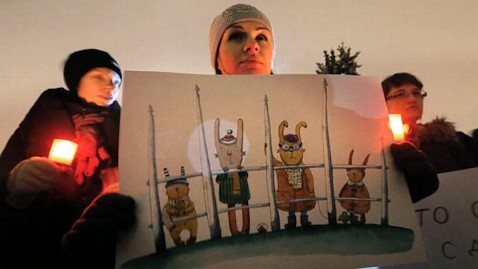* Soni Sori, a tribal teacher in a government school in Dantewada, Chhattisgarh, was arrested in October last year on charges of being a courier between the Maoists and Essar Group which has mining interests in the region. She alleged that she had been sexually assaulted by the Chhattisgarh police and a Kolkata hospital that examined her had found stones in her private parts and rectum.
* In November this year, Chhattisgarh police and CRPF (Central Reserve Police Force) rescued two minor tribal girls who were allegedly gang-raped by Maoists in Bijapur, Bastar district.
* In July 2004, the rape and murder of Thangjam Manorama Devi in Imphal by Assam Rifles personnel had rocked the nation with several women's groups in Manipur coming out naked in the streets to protest. A few days back, Imphal witnessed mob violence over government's inaction on molestation of an actress by an NSCN (IM) cadre.
* On the night of February 23 and 24, 1991, personnel of the 4 Rajputana Rifles had raped about 30 women in Kunan Poshpora village in the border district of Kupwara in north Kashmir.
*A young girl in Jharkhand's insurgency-hit Khunti district had to flee a separatist camp after she was forced to sleep with five Naxalites every night, according to Baidyanath Kumar of the NGO Diya Seva Sansthan that had rescued her.
Even as the Delhi bus gang-rape case simmers, women in India's insurgency-hit areas —Kashmir, Chhattisgarh, Jharkhand or the North East — continue to be exploited sexually both by separatists and the security forces. Often, women endure sexual abuse in return for life of their families. Women in villages of border districts of Rajouri or Poonch in Jammu and Kupwara and Uri in Kashmir are known to submit to sexual exploitation by militants from across the border, besides giving them food and shelter, in return for the safety of their families. In fact, sources reveal that soldier husbands inform their wives in advance of their arrival on holidays so that the terrorists can move out of their homes in time.
In Naxalite-hit areas, many women end up being recruited in the cadres, where they are exploited sexually. Says Baidyanath Kumar, "The Naxals induct women by force for dual purpose. They serve as sex slaves and cook for them too." Shambhu Kumar, Ranchi ASP (Operations), adds, "99% of women Naxals, whether arrested or those who have surrendered complain of sexual harassment in the camps." Often, women are left with no choice — they either give into the state-sponsored vigilantes, Salwa Judum, or tag along with Maoist cadres.
Most often, cases of sexual crimes go unreported either due to remoteness of the location or victims choosing to stay silent out of fear or social stigma attached to such exploitation. Babloo Loitongbam, director of Imphal-based Human Rights' Alert, says, "In a conflict zone, targeting women's honour becomes a contest between the warring parties. And the reported cases of rape by army or the para-military forces in Manipur are just the tip of the iceberg. We have documented over 20 rape cases in the last few years but most go unreported." Even if the victim reports the crime, most of these cases remain unsolved and justice remains elusive.
Anjuman Ara Begum, a Guwahati-based law researcher, says that sexual crimes in armed conflicts are always treated with a 'forget and forgive' policy. "Security forces enjoy immunity as prior sanctions are required for initiating legal cases against them under Afspa (Armed Forces Special (Powers Act), 1958) and CrPC." Many states in the North East are under the Afspa.
— Reporting by Joseph John in Raipur, Oinam Sunil in Guwahati, M Saleem Pandit in Srinagar and Alok K N Mishra in Ranchi.










